Rocks ahead
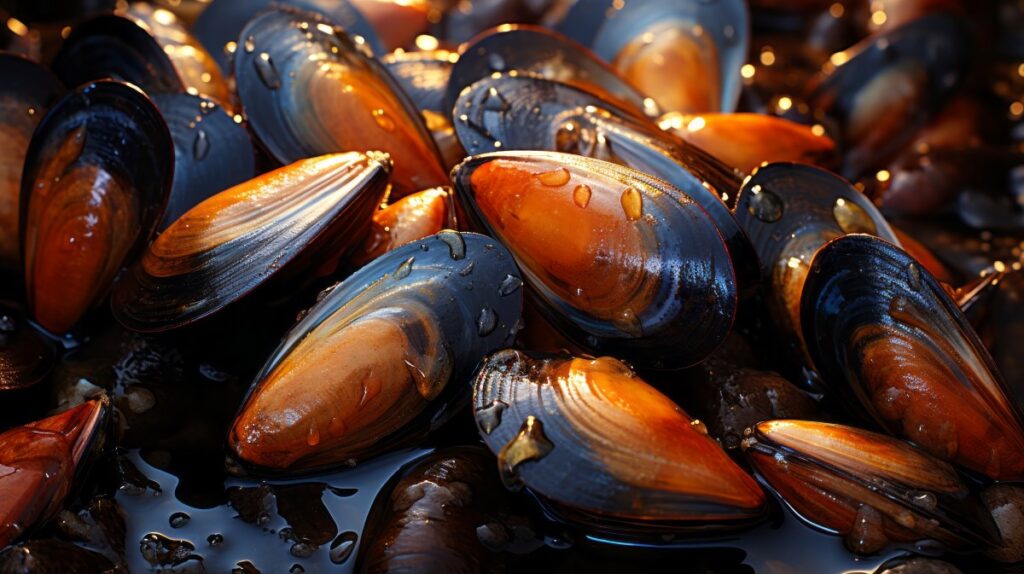
Is shellfish farming still viable in the UK? Nicki Holmyard reports on a paper that sets out to answer that question
The past president of the Shellfish Association of Great Britain (SAGB), Jeremy Simmonds, has seen the industry go through many highs and lows over the decades, but says he has never seen shellfish aquaculture businesses deal with as many serious concerns as they face today, particularly the deterioration of water quality. They are also confronted by powerful stakeholder groups that are inherently opposed to all forms of aquaculture, including shellfish aquaculture.
Keen to put his accumulated knowledge to good use, Simmonds recently wrote a paper for SAGB that looks at the history of shellfish production in the UK, the development of the industry and the issues.
He finds that the expansion of shellfish aquaculture offers a genuine way to enhance national food security and that good water quality is a critical asset. However, diverse sources of water pollution are having a deleterious effect on shellfish farms. Due to the heavy burden of proof required in law, there is no realistic way to compensate the farmers if the water quality in their production areas deteriorates. It is hoped that improvements in testing methods and the manner and frequency of testing for classification of waters may lead to improvements in this situation.
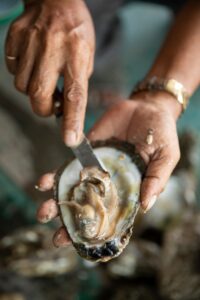
Shucking oysters
The big question is, what is the timeline for these improvements?
Simmonds points out that officially designated “Shellfish Waters” provide no remedy for the shellfish farmer against pollution and there is no evidence that effective enforcement of the regulations protecting Shellfish Waters will provide any measure of comfort in the foreseeable future.
Too many businesses have failed in the past few years, particularly since Brexit, which has left those producing in Class B waters unable to export their mussels. Bulk depuration is not desirable if the product is not immediately packaged for final consumption, but is destined for further immersion as part of a due diligence process at a European destination.

Brexit has created challenges for the sector
Brexit blues
In effect, the loss of the export market following the departure of the UK from the EU is the biggest limiting factor in terms of expanding the industry. Simmonds believes it has become the “elephant in the room” as far as shellfish aquaculture is concerned.
He believes that the Brexit-related experiences of shellfish farmers “…have been such as might discourage those who could be contemplating entry into, making an investment in or perhaps commencing a career in shellfish aquaculture.”
The short-term remedy is for the UK to negotiate a political solution in the form of a derogation from EU rules or a trade deal to allow export from Class B waters and subsequent depuration in the EU.
The long-term solution is for government to take a whole watershed approach to cleaning up our rivers and their estuaries. Only then will we regain the confidence of people to invest in shellfish farming.
Simmonds took a look at reported English aquaculture production figures for mussels, Pacific oysters and native oysters as provided by Cefas for the years 2008 to 2021. These figures, which exclude Scotland and Wales, showed that at its peak in 2013, mussel production was just over 4,000 tonnes, dropping to 2,943 tonnes in 2019, 2,674 in 2020 and 2,351 in 2021.
Pacific oyster production has hovered around the 1,000 tonne mark since 2014, with peaks of 1,220 in 2019 and 1,147 in 2021, and a low of 682 in 2020.
Native oyster production fell from a high of around 90 tonnes in 2010/11 to just 11 tonnes in 2021. This species is now the focus of several major well-funded restoration projects.
While trends indicated by statistics must always be treated with caution, Simmonds suggests that there is huge potential to grow the shellfish aquaculture industry. He cites the positive example of the Offshore Shellfish mussel farm in Lyme Bay and hopes that it will be possible to build on this.
Unfortunately, the potential to grow Pacific oyster production is threatened, and in some cases even cancelled, by Natural England’s (NE) current approach. This regards them as an invasive, non-native species, with the government advised against any expansion north of the 52nd parallel. Recommended use of triploid oysters is below that line.
A further knock-on impact of NE’s stance is that some shoreline owners have stopped supporting the sector. The Duchy of Cornwall, for example, has decided to phase out all Pacific oyster farm leases over the next two to three years on sites where they already exist. No new leases will be granted. Their decision will close several businesses in Cornwall and provide an example for other shoreline owners.
On Marine Protected Areas, Simmonds finds that they are well suited to shellfish aquaculture. This activity should be actively encouraged within them, although such a move would need a complete rethink on the Pacific oyster situation from Natural England.
Between 2013 and 2021, the approach to aquaculture in published Marine Plans was downgraded to what appears to be “unthinking and repetitive lip service”, according to Simmonds, and there is little or no encouragement for aquaculture to be derived from the current MMO Strategy. Instead, government and regulators continue to fail to address issues.
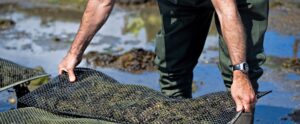
Oyster bags
A failure of strategy
Over the years, various strategy documents and plans have been published that include ambitious targets and assurances of support for shellfish aquaculture, including Defra’s 2015 multiannual plan and the Seafood 2040 Aquaculture Strategy for England. These have been shown to be either over-optimistic or lacking in progress and it is not for want of ambition or effort on the part of the shellfish industry. In fact, the exciting initiative provided by Seafood 2040 seems to have died.
In the meantime, shellfish aquaculture remains faced with a complex bureaucracy that requires the shellfish farmer to deal with, seek consent from and in some cases, make significant payments to a wide range of bodies.
David Jarrad, SAGB CEO, commented: “The report shows a sad state of affairs but also huge opportunities, if only government and its agencies would get fully onboard and help facilitate the sector.”
Simmonds paints a rather bleak future for the industry in his report, but he finds that there are still opportunities to be exploited, if the political will can be generated and regulatory procrastination and opposition downgraded. This demands actions, not words.
It appears that there is much work ahead of us to get everyone to understand and accept the benefits of growing mussels and oysters, and to build a regulatory system that supports rather than hinders the industry. Seaweed, the new kid on the block in the UK, can do no wrong it seems, but at present it is producing more hype than substance.
Jeremy Simmonds’ report What Hope for Shellfish Farmers? is available to download from bit.ly/simmonds-shellfish-report
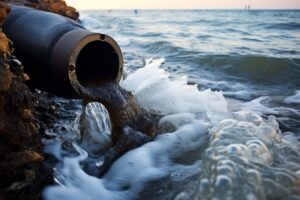
What’s wrong with the water?
A second report, prepared for SAGB by Joe Redfern, sheds light on the profound socioeconomic impacts of poor and declining water quality on the UK’s shellfish aquaculture industry. The challenges they face as a direct result of poor water quality include diminished yields, increased production costs and eroded consumer trust.
Recommendations include robust investments in water quality improvement, financial support based on the polluter pays principle, research and development for efficient testing, and consumer education to boost confidence. The report concludes with a call for collaborative efforts from government, industry stakeholders and the public to secure the future of the shellfish industry.
Socioeconomic Impacts of Water Quality on the UK’s Shellfish Aquaculture Industry (SAGB) can be downloaded from bit.ly/impact_water_quality
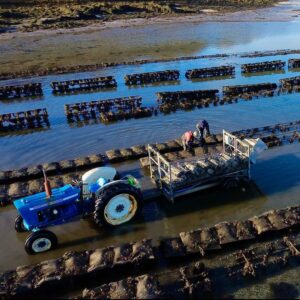
Isle of Mull Oysters
Isle of Mull Oysters
Achieving certification under the Aquaculture Stewardship Council’s (ASC) strict standards is a daunting challenge even for large companies, but Gordon Turnbull and his colleagues at Isle of Mull Oysters have been celebrating winning this coveted status.
The business, a member of the cooperative organisation Scottish Shellfish, is based on Mull in the Inner Hebrides, off Scotland’s west coast.
Marketing through the cooperative, it numbers leading retailer Waitrose among its customers – which was a large part of the motivation for going through the ASC process.
Turnbull explains that the certification process covers not only sustainability and traceability aspects – both of which were already intrinsically a part of the company’s business model – but also social responsibilities.
He says: “There were a lot of things, previously taken on trust, that we had not written down.”
The sheer administration involved in the process could have been a lot for a small operation to handle, but Scottish Shellfish is able to cover the costs of certification and helps its members through the paperwork.
With the certification under his belt, Turnbull is now able to concentrate again on the day job, ensuring, as he puts it: “Guaranteed freshness and a good, healthy, clean product.”

